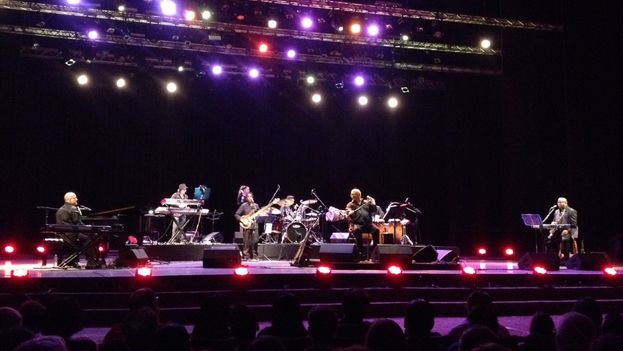
![]() 14ymedio, Luz Escobar, Havana, 28 December 2015 – Pablo Milanes gave a splendid concert on Saturday night to those who, with their Christmas hangovers, made it to the Karl Marx Theater in Havana. Starting before seven in the evening, the audience gathered in the doorways to enter the venue for what would be presentation with a memorable repertoire and guests.
14ymedio, Luz Escobar, Havana, 28 December 2015 – Pablo Milanes gave a splendid concert on Saturday night to those who, with their Christmas hangovers, made it to the Karl Marx Theater in Havana. Starting before seven in the evening, the audience gathered in the doorways to enter the venue for what would be presentation with a memorable repertoire and guests.
The show began Tú mi desengaño (You, my disappointment) in the voices of the singer’s three daughters: Haydee, Suylen and Lynn Milanes. A sign that this singer’s lineage extends to the talent of artists who have the same surname but their own styles.
After the family reunion on stage, the show continued with the performance of Requium para un amor (Requium for a love) by the singer Miriam Ramos, followed by the versatile Fransico “Pancho” Cespedes, who sang the classic Ya ves (Now you see), and presented Milanes to a standing ovation from the audience.
The concert honored the theme Mis 22 años (My 22 years), five decades after it was composed, and had a luxurious guitar accompaniment by Jesus Cruz Dias. The song Cuanto gané, cuanto perdí (How much won, how much lost) preceded Los males del silencio (The evils of silence), a composition that recalls that “silence does not arise to live, silence is reborn to die.”
He could not skip Canto a La Habana (I sing to Havana) or Canción (Song), a theme that many know with the title De qué callada manera (In what a quiet way) and in which the verses of the poet Nicolas Guillen are set to music. Si ella me faltara aguna vez (If she misses me sometime) and Nostalgias echoed with the same freshness as those Días de Gloria (Days of glory). Meanwhile, Matinal (Morning), Plegaria (Prayer) and La libertad (Freedom) completed the first part of a concert where the voice of Milanes shone through, clean, fresh and clear, as always.
The presentation was recorded for the production of the album Aquellos 22 años, which will collect testimonies on the appearance of the song and what it has meant for Cuban music. The evening was especially dedicated to those in their twenties, although the audience was made up of all generations.
In particular, those who came to the Karl Marx theater lived and loved with songs such as No ha sido fácil (It hasn’t been easy). Those who had seen, grown up and even grown old listing to Ámame como soy (Love me like I am) or Años (Years) were unmistakable, and Milanes sang his immortal phrase, “Time passes and we are getting old.”
Pablito was accompanied by a battery of excellent musicians such as Sergio Raveiro on bass, Esteban Puebla on guitar and keyboards, Edgar Martinez on percussion, Osmani Sanchez on drums and Germán Velazco on sax and flute. At the piano, as always, was Miguelito Núñez, also the musical director of the group.
Almost as a farewell the chords of Para vivir (To live) sounding, and of this immense theme, obligatory in Milanes’s repertory, the song named after a woman, Yolanda. The singer also left room to intone, along with his audience, El breve espacio en que no estás (The brief space where you are not), and the speakers rang with a selection of songs such as Pobre del cantor (Poor man, the singer), Hoy la vi (Today I saw her), and Yo no te pido (I am not asking you), while the audience said goodbye to an unforgettable Saturday night.
Fifty years of a song has just been an excuse for Pablo Milanes to bring joy to this Christmas, and to make the blue star of good music fall over Havana.
